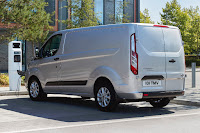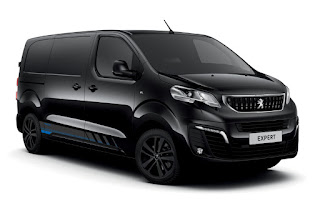Transit Custom PHEV is ready for production
Following a twelve-month trial with various operators in London, the Ford Transit Custom plug-in hybrid will soon make the transition from prototype to showroom model. The new arrival has the potential to seriously disrupt the medium van market.
Importantly, its range-extender powertrain doesn’t affect the load space or payload capabilities.
An under-floor 14 kWh liquid-cooled lithium-ion battery pack transfers current to an electric motor, which in turn drives the front wheels. A 1.0 litre EcoBoost petrol engine is also a key part of the specification, but this three-cylinder unit is used solely as an on-board generator.
Performance and overall efficiency figures have yet to be released. However, Ford reckons that range in ‘EV Now’ pure electric mode should be around 30 miles (50 kilometres).
Two other settings can be selected. ‘EV Later’ deploys the combustion engine to maintain the battery’s charge state, while the default ‘EV Auto’ chooses the most appropriate energy source without any human intervention.
Fully replenishing the battery via a domestic 240 volt / 10 amp supply takes about five hours. Alternatively, plugging into 240 volt / 16 amp or 240 volt / 32 amp sockets would reduce that time by a couple of hours.
Market launches for the Ford Transit Custom PHEV are scheduled to begin during the second half of 2019. Admittedly, it’s still too early for pricing to be announced, but any premium over the diesel versions is highly likely to influence demand.
Related posts:
Ford gives its Transit Custom a facelift for 2018
Transit Custom PHEV to be trialled in London
Importantly, its range-extender powertrain doesn’t affect the load space or payload capabilities.
An under-floor 14 kWh liquid-cooled lithium-ion battery pack transfers current to an electric motor, which in turn drives the front wheels. A 1.0 litre EcoBoost petrol engine is also a key part of the specification, but this three-cylinder unit is used solely as an on-board generator.
Performance and overall efficiency figures have yet to be released. However, Ford reckons that range in ‘EV Now’ pure electric mode should be around 30 miles (50 kilometres).
Two other settings can be selected. ‘EV Later’ deploys the combustion engine to maintain the battery’s charge state, while the default ‘EV Auto’ chooses the most appropriate energy source without any human intervention.
Fully replenishing the battery via a domestic 240 volt / 10 amp supply takes about five hours. Alternatively, plugging into 240 volt / 16 amp or 240 volt / 32 amp sockets would reduce that time by a couple of hours.
Market launches for the Ford Transit Custom PHEV are scheduled to begin during the second half of 2019. Admittedly, it’s still too early for pricing to be announced, but any premium over the diesel versions is highly likely to influence demand.
Related posts:
Ford gives its Transit Custom a facelift for 2018
Transit Custom PHEV to be trialled in London











Comments
Post a Comment